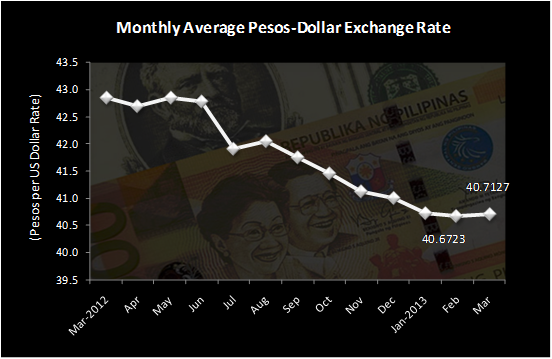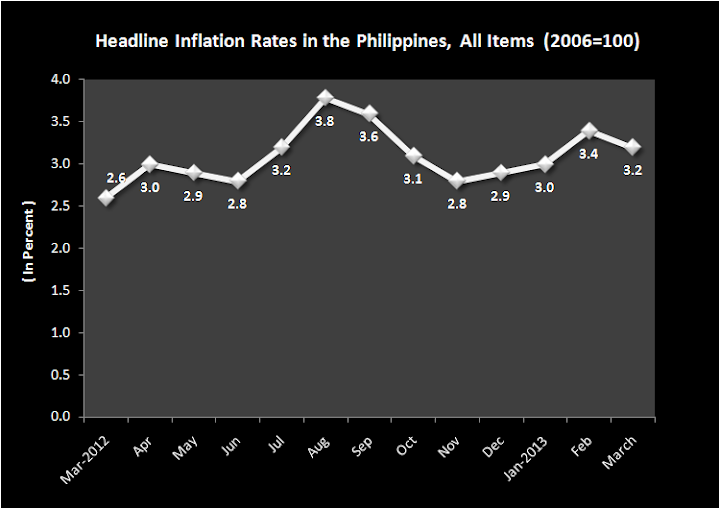Having trouble reading this email? View it in your browser. Not interested anymore? Unsubscribe Instantly.
|
 |
| Tuesday, 07 May 2013 |
|
IN FOCUS: The Fight against Poverty
 The latest poverty statistics released by the National Statistical Coordination Board (NSCB) have attracted considerable attention as they clearly show that the country has still got a long way to go in its fight against poverty. There is no significant reduction in poverty incidence as of the first semester of 2012 compared with 2006 and 2009 figures from the triennial Family Income and Expenditure Survey (FIES). The NSCB estimated poverty incidence at 27.9 percent of the population during the first half of 2012, a figure not statistically different from the rate of 28.6 recorded in 2009. The latest poverty statistics released by the National Statistical Coordination Board (NSCB) have attracted considerable attention as they clearly show that the country has still got a long way to go in its fight against poverty. There is no significant reduction in poverty incidence as of the first semester of 2012 compared with 2006 and 2009 figures from the triennial Family Income and Expenditure Survey (FIES). The NSCB estimated poverty incidence at 27.9 percent of the population during the first half of 2012, a figure not statistically different from the rate of 28.6 recorded in 2009.
PIDS has made groundbreaking research on the complex nature and multidimensional aspects of poverty. It has also helped to enhance poverty measurement which is critical for the government in carrying out the task of poverty reduction. Who and where are the poor? How is the poverty line drawn? Beneath aggregate poverty measures, there is “chronic” and “transient” poverty, and different kinds of interventions are needed to effectively target each type. There is still much leeway to tighten the eligibility criteria for poverty-reduction programs such as the Pantawid Pamilyang Pilipino Program, the Philippine version of conditional cash transfers.
Find out more about PIDS studies on poverty. Understand the issues behind poverty measurement, dynamics of poverty, poverty’s relation to agriculture, trends in income and poverty distribution, evaluation of poverty situation, effectiveness of government poverty-reduction programs, among others. The ultimate goal of development is to significantly reduce the ranks of the poor, an objective that, more than anything else, requires evidence-based policymaking.
You may access these studies and more via the SocioEconomic Research Portal for the Philippines by simply typing ‘poverty’ in the Search box. |
|
| |
|
 New industrial policy seen crucial to address the country`s laggard economic growth New industrial policy seen crucial to address the country`s laggard economic growth
The government needs an inclusive growth model to transform the industrial sector into a key player in generating investment, employment, and innovation. A research study by PIDS Senior Research Fellow Rafaelita Aldaba recommends to the present administration to implement industrial policy reforms that will enhance the country`s firm productivity, deepen linkages of domestic firms and small and medium enterprises (SMEs) with large domestic and multinational companies, and gain more investment inflows. <<READ MORE
 Organizational membership and good education may help persons with disabilities gain employment Organizational membership and good education may help persons with disabilities gain employment
Persons with disabilities (PWDs) who are members of the Disabled Person`s Organization (DPO) and have good educational background have better access to employment.
A research study conducted by PIDS Research Associate Christian Mina found that DPO membership and educational attainment are strongly correlated with higher employment opportunities among PWDs. The findings were obtained through an analysis of the 2008 and 2010 disability surveys in selected cities of Metro Manila and Rosario, Batangas, respectively. <<READ MORE
 SMEs must be ready for ASEAN economic integration by 2015 SMEs must be ready for ASEAN economic integration by 2015
Two years from now, the Philippines and other ASEAN members will be moved toward a single market and production base under the ASEAN Economic Community (AEC) by 2015. However, the readiness of our small and medium enterprises (SMEs) for this regional economic integration draws a big question mark.
PIDS Vice President Rafaelita Aldaba`s study raises concerns over the weak performance of SMEs despite regional measures implemented in the ASEAN Strategic Action Plan for SME Development 2010-2015 (ASAPSD)... <<READ MORE
 Pantawid Pamilyang Pilipino must deepen its assistance to beneficiaries Pantawid Pamilyang Pilipino must deepen its assistance to beneficiaries
DSWD`s Pantawid Pamilyang Pilipino program or 4Ps must provide longer assistance to its present beneficiaries instead of increasing the number of its beneficiary families.
A recent study of PIDS Senior Research Fellow Celia Reyes and Supervising Research Specialist Aubrey Tabuga recommends the extension of 4Ps assistance to current beneficiary families to ensure that their children can finish high school. If this happens, they will have more employment opportunities when they enter the labor market.<<READ MORE
|
| |
|
Inception Workshop: Competition Reforms in Key Markets for Enhancing Social and Economic Welfare in Developing Countries (CREW Project)
Co-Sponsors: Dept. of Agriculture, Dept. of Justice, Dept. of Transportation and Communication
Date: May 7, 2013
Time: 9:30-2:30 p.m.
Venue: C.P. Romulo Hall, NEDA sa Makati Bldg., Amorsolo St., Legaspi Village, Makati City
Partners' Meeting: Health Systems Research Management Program
Co-Sponsor: DOH
Date: April 23,2013
Time: 09:00
Venue: C.P. Romulo Hall, NEDA sa Makati Bldg., Makati City

Financing Infrastructure Development: Getting the Incentives Right
Co-Sponsors: National Economic and Development Authority (NEDA) and Public-Private Partnership (PPP) Center
Date: April 16,2013
Time: 3:00 p.m.
Venue: Carlos P. Romulo Hall, NEDA sa Makati Bldg., 106 Amorsolo Street, Legaspi Village, Makati City
|
| |
|
Peso-Dollar Exchange Rate
 The monthly average peso-dollar exchange rate slightly went up to 40.7127 in March, from 40.6723 in February 2013. The monthly average peso-dollar exchange rate slightly went up to 40.7127 in March, from 40.6723 in February 2013.
For more details, please refer to this link: http://econdb.pids.gov.ph/tablelists/table/49
Source: Bangko Sentral ng Pilipinas (BSP)

Inflation Rate
 The year-on-year headline inflation rate* went down to 3.2 percent in March from 3.4 percent in February 2013. This mainly due to food and non-alcoholic beverages; housing, water, electricity, gas and other fuels; household equipment and routine maintenance of the house; transport; and communication indices. Core inflation rate** remained 3.8 percent in March. The year-on-year headline inflation rate* went down to 3.2 percent in March from 3.4 percent in February 2013. This mainly due to food and non-alcoholic beverages; housing, water, electricity, gas and other fuels; household equipment and routine maintenance of the house; transport; and communication indices. Core inflation rate** remained 3.8 percent in March.
For the regional headline inflation rates, please refer to this link: http://econdb.pids.gov.ph/tablelists/table/568
Source: National Statistics Office (NSO)
*Headline inflation rate refers to year-on-year change in the overall Consumer Price Index (CPI).
**Core inflation rate is the rate of change in the headline CPI after excluding selected food and energy items. |
| |
|
POLICY NOTES
 (Policy Notes 2013-05) Can the Philippine Auto Industry Survive Smuggling? (Policy Notes 2013-05) Can the Philippine Auto Industry Survive Smuggling?
by Rafaelita M. Aldaba
The automotive industry is a highly competitive and technology-intensive industry. It requires large economies of scale and high degree of specialization in parts and components manufacturing. The relatively small size of the domestic market is made worse by the entry of smuggled used vehicles. This Policy Notes analyzes the exacerbating issue of auto smuggling in the country. It shows the murky policy environment that has hampered efforts to address it and examines the extent of its negative impacts on government revenues and in our bid to develop a globally competitive auto industry. Click here for the full article
 (Policy Notes 2013-04) Where Are the Poor Employed? Profiling the Working Poor (Policy Notes 2013-04) Where Are the Poor Employed? Profiling the Working Poor
by Mina, Christian D.,Reyes, Celia M.
The poor, in general, have lower levels of education because they tend to prioritize their daily basic needs and put lower investment in education. Local studies on poverty correlates note that members of poor households more likely have lower levels of education. This Notes intends to raise understanding on the impacts of low education on the employment outcomes of the poor. It analyzes the profile of the working poor based on data from the Labor Force Survey and Annual Poverty Indicators Survey of the National Statistics Office and looks at possible interventions that can promote inclusive growth. Click here for the full article.
 (Policy Notes 2013-03) Community-based Approaches Toward Upgrading of Informal Settlements: Alternative Strategies and Recommendations for Policymaking (Policy Notes 2013-03) Community-based Approaches Toward Upgrading of Informal Settlements: Alternative Strategies and Recommendations for Policymaking
by Galuszka, Jakub
Within the last 30 years, the relevance of participatory methodologies has continuously been increasing in the housing sector in transition and developing countries. Thanks to their positive impacts on the social, environmental, and financial sustainability of projects, participatory approaches have steadily been gaining support and recognition from mainstream or conventional development agencies. This Policy Notes illustrates the state of development and implementation of community-based approaches in the Philippines toward the upgrading of informal settlements, describes the potential of these approaches, and provides some recommendations for policymaking. Click here for the full article.

ECONOMIC ISSUE OF THE DAY
 Sovereign Credit Ratings Sovereign Credit Ratings
by Felipe F. Salvosa II
The Philippines has finally reached "investment grade" status. What does this mean for the government, the economy, and business? More importantly, what is in store for the ordinary Filipino struggling to make a living? In a nutshell, credit ratings represent assessments by credit rating agencies on the risk that a borrower (in our case, a sovereign nation, the Republic of the Philippines) would default on its debts.
Governments and firms need to get a credit rating to raise funds from bonds, and ratings influence borrowing costs. Credit ratings are not to be taken as "buy" or "sell" recommendations, as they are merely "opinions" about credit risk. At most, an investment-grade rating can be regarded as a "seal of good housekeeping" as far as the government`s financial stability is concerned. Click here for the full article.

DISCUSSION PAPER SERIES
- (DP 2013-31) Analysis of the President`s Budget for 2013
by Manasan, Rosario G.
- (DP 2013-30) From Highly Skilled to Low Skilled: Revisiting the Deskilling of Migrant Labor
by Siar, Sheila V.
- (DP 2013-29) Review and Assessment of Programs Offered by State Universities and Colleges
by Manasan, Rosario G.
- (DP 2013-28) Efficiency and Effectiveness Review of the National Housing Authority Resettlement Program
by Ballesteros, Marife M.,Egana, Jasmine V.
- (DP 2013-26) Managing International Labor Migration in ASEAN: Themes from a Six-Country Study
by Orbeta, Aniceto Jr. C., Gonzales, Kathrina G.
- (DP 2013-25) Impact of Trade Liberalization on Wage Skill Premium in Philippine Manufacturing
by Aldaba, Rafaelita M.
- (DP 2013-24) Assessment of the Effectiveness and Efficiency of the Cadastral Survey Program of the Department of Environment and Natural Resources
by Llanto, Gilberto M., Rosellon, Maureen Ane D.
- (DP 2013-23) Impact Assessment of the Agricultural Production Support Services of the Department of Agriculture on the Income of Poor Farmers/Fisherfolk: Review of the Evidence
by Briones, Roehlano M.
- (DP 2013-22) Assessment of the Efficiency and Effectiveness of the Reforestation Program of the Department of Environment and Natural Resources
by Israel, Danilo C., Lintag, Jeffrey H.
- (DP 2013-21) Twenty Years after Philippine Trade Liberalization and Industrialization: What Has Happened and Where Do We Go from Here
by Aldaba, Rafaelita M.
- (DP 2013-20) Perspectives on Health Decentralization and Interjurisdictional Competition among Local Governments in the Philippines
by Llanto, Gilberto M., Kelekar, Uma
|
FOR MORE UPDATES, PLEASE CONNECT WITH US ONLINE:
  |
Need Help? Have Feedback? Feel free to Contact Us.
If you do not want to receive information about PIDS Updates, click here.
© 2013 Philippine Institute for Development Studies. |
|
|
|
|
|